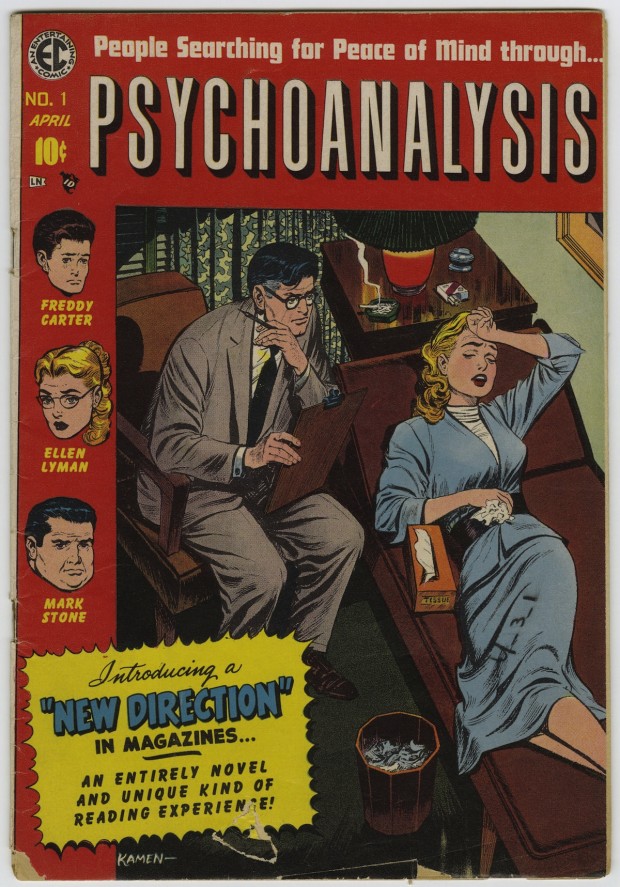An iconographic and text archive related to communication, technology and art.
☛ Yale University Beinecke Rare Book and Manuscript Library: “People searching for peace of mind through psychoanalysis” (Psychoanalysis, New York, N.Y. : Tiny Tot Comics, no. 1, April 1955), 1 front cover, color illustration, 26 cm. A reproduction of higher resolution (2123×4183, 72dpi) is available at the link.
This comic book was part of the exhibition Psyche and Muse: Creative Entanglements with the Science of the Soul which was held at Beinecke Rare Book and Manuscript Library, Yale University, from January 28 through June 13, 2011.
The comics (Nos 1 through 4, therefore including the one depicted above) were exhibited in the section “Dr. Froyd: Psychoanalysis in the Popular Imagination”. Here’s a more detailed description of what exactly was this series of comic books:
Published in 1955, issues of the comic book Psychoanalysis introduced readers to psychoanalytic therapy by following three patients through a series of analytic sessions. The editors’ introductory note informs readers that “for dramatic effect and entertainment value we plan to telescope each analysis into three to five issue-sessions.” In reality, editors warn, analysis might take several years and listening in to an actual session might cause “boredom beyond all endurance.” “Through the medium of the comic format,” the editors wrote, “we will attempt to portray, graphically and dramatically, the manner in which people find peace of mind through the science of psychoanalysis.” Intended for educational purposes, readers are warned: “this magazine is not intended to fulfill the function of a psychoanalyst.” Tiny Tot Comics was a branch of E. C. Comics, publisher of Tales from the Crypt and Mad; E.C. Comics created Psychoanalysis and other “educational” titles in response to broad condemnation of comic books as a corrupting influence on American youth. (from the checklists and object descriptions for this specific section: PDF)
All items described in all of the exhibition nine checklists can be found using Yale Library’s primary finding tools: Orbis, the catalog for books; Yale’s Finding Aid Database for manuscript materials; and the Beinecke Digital Library. Some of this material, like to cover for the comic book Psychoanalysis depicted above, are accessible online.
A more thorough presentation of the exhibition can be found in the official Exhibition Booklet (PDF) as well as on the blog of the Beinecke Rare Book and Manuscript Library (Room 26 Cabinet of Curiosities: “Psyche & Muse Online”, March 9, 2011). Here’s the introduction from the official Exhibition Booklet:
Psyche and Muse explores cultural, clinical, and scientific discourse on human psychology and its influence on twentieth-century writers, artists, and thinkers. Tracing important themes in the lives and work of key figures and artistic communities represented in the Beinecke Library’s Modern European and American Literature collections, the exhibition documents a range of imaginative encounters involving the arts and the study of the mind. The books, manuscripts, and visual works in Psyche and Muse represent aesthetic and philosophic lineages from the late nineteenth century to the postwar era; the exhibited materials reveal ways in which the study of psychology and core concepts of psychoanalysis were both intertwined and at odds with artistic production throughout the twentieth century.
Finally, it worth noting that following Beinecke Rare Book and Manuscript Library’s blog, Room 26 Cabinet of Curiosities, really is a great way to learn about its collection and unusual items. It keeps its archive alive by featuring various materials along with contextual information on a regular basis. Yale Library is not the first one to use a blog in order to promote its archive. For example the Library of Congress maintains multiple blogs. Its Print and Photos blog titled Picture This is a favorite of mine.
• • •
I first learned about the Psyche and Muse exhibition via 50 Watts
- By Philippe Theophanidis
- on
- ― Published in Art, Communication, Illustration
- Tagged: archive, comic, illness, library, mind, patient, psychoanalysis

